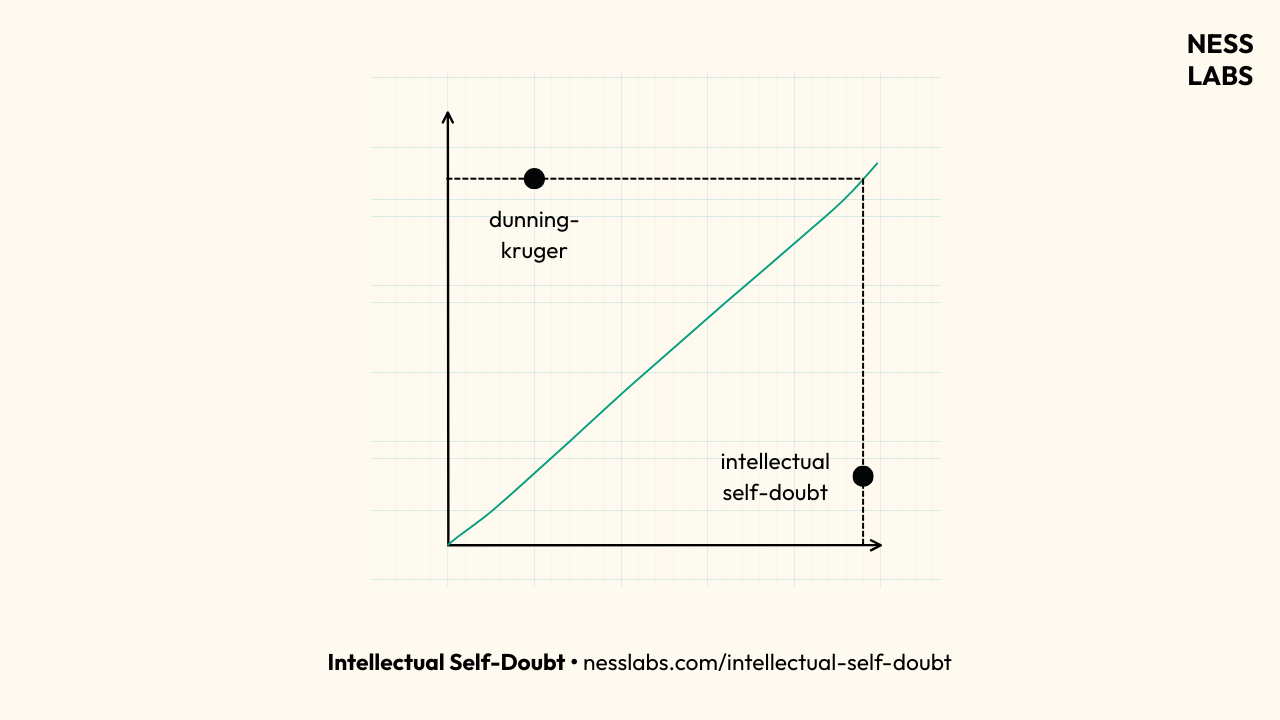Here’s one of my favorite quotes: “I am not a writer. I’ve been fooling myself and other people.” This comes from the diary of John Steinbeck, who won the 1962 Nobel Prize in Literature.
This kind of intellectual self-doubt is common among high achievers. The smarter they are, the more acutely they seem to question their own competence.
Why is it that those with the most evidence of their abilities are often the ones who doubt themselves most? How come intellectual achievement doesn’t translate into intellectual confidence?

Why smart people doubt their own abilities
When I was working at Google, I constantly felt like someone would discover I didn’t belong there. Everyone around me seemed so much smarter. Then one day, I found an internal group called “The Impostors” filled with anonymous posts from colleagues sharing the exact same fears. It was somehow a relief to find out that I wasn’t the only one.
This experience captures the essence of intellectual self-doubt, a psychological pattern where capable people question their competence. It’s often associated with impostor syndrome, the well-documented fear of being exposed as a fraud, despite clear evidence of one’s abilities and which was first identified in 1978 by psychologists Dr Pauline Clance and Dr Suzanne Imes.
They observed this pattern in high-achieving women and described a feeling of “intellectual phoniness.” But recent research suggests it affects people across all demographics and up to 82% of people experience it at some point in their careers.
When we question our competence, the brain’s default mode network becomes hyperactive, putting us into an anxious self-referential thinking loop. Meanwhile, our prefrontal cortex, which is among other things responsible for self-monitoring, can become overwhelmed, making it harder to accurately assess our actual abilities.
Patterns of intellectual self-doubt
Understanding the different ways intellectual self-doubt shows up can help you recognize your own patterns. Dr Valerie Young, a leading expert on the topic, has identified five distinct behavioral patterns:
- The perfectionist sets impossibly high standards and feels like a failure when they don’t meet 100% of their goals. If you’re often dissatisfied with your performance and ruminate about how you could have done things better, you might fall in this category.
- The natural genius expects to master things quickly and easily. These people were often told that they were smart from a very young age and are used to performing well relatively easily. Because of this, they also set their internal bar for success incredibly high and interpret normal struggle as evidence they’re not cut out for the work.
- The soloist believes asking for help reveals weakness. While being independent can be a good thing, soloists take it a step too far and exhaust themselves trying to figure everything out independently rather than leveraging collective knowledge.
- The super(wo)man works harder than everyone else in an attempt to hide what they believe is a lower level of competence. They’re often the first to volunteer for extra projects and the last to leave (virtually or physically), sacrificing personal time to prove their worth.
- The expert thinks they need to know everything before speaking up. They measure their competence based on how much they know. If you fall in this category, you might be delaying applying for promotions or sharing ideas in meetings, constantly seeking more certifications or training to feel “qualified enough.”
These patterns of intellectual self-doubt often compound over time, creating cycles where the more someone achieves, the more fraudulent they feel.
The secrecy surrounding these feelings only intensifies the experience and prevents people from seeking support, which can lead to burnout. Fortunately, there’s a way out.
How to build intellectual confidence
There’s no magic bullet to beat impostor syndrome, but there are a few strategies you can apply to better manage the anxiety and start accepting that nobody made a mistake, and you belong to the group of smart and talented people you get to work with.
Reframe your internal narrative. Replace “I don’t know what I’m doing” with “I’m learning as I go.” Yes, it can feel cheesy to talk to yourself, but research shows that these kinds of self-affirmations activate the brain systems associated with reward, so you’ll feel good about the process.
Practice just-in-time learning. Instead of trying to be an expert on everything and hoarding knowledge, acquire relevant skills when needed for specific tasks. And to make your progress more visible, keep a learning log documenting one new skill or insight you’ve gained as part of your weekly review.
Realize that there’s no shame in asking for help. Asking generative questions is a helpful skill that takes practice. If you don’t know how to do something or struggle to solve a problem, try asking a coworker first instead of struggling to solve it on your own.
Celebrate your achievements. Everytime you reach a milestone, take the time to celebrate your hard work – even if it’s just a micro-win. Then, extract useful knowledge by asking: “What worked well?” and “What would I do differently?” This metacognitive practice creates growth loops rather than a linear pass/fail mentality.
Embrace experimental thinking. Turn big challenges into tiny experiments. Scientists run countless trials and most of their hypotheses prove wrong, but each experiment generates valuable data. Apply this mindset to reduce your fear of failure and cultivate curiosity about what you might discover in the process of trying.
Importantly, remember that the most successful people aren’t those who never doubt themselves, but those who’ve learned to move forward despite the doubt. Intellectual self-doubt and the associated impostor syndrome are often a sign that you’re challenging yourself and growing.
